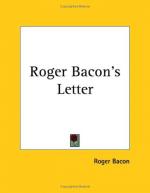|
This section contains 14,674 words (approx. 49 pages at 300 words per page) |

|
SOURCE: "Roger Bacon and Philology," in Roger Bacon Essays Contributed by Various Writers on the Occasion of the Commemoration of the Seventh Centenary of His Birth, edited by A. G. Little, Oxford at the Clarendon Press, 1914, pp. 101-51.
In the following excerpt, Hirsch offers a disinterested assessment of the philological theory and practice of Bacon, tracing possible sources and assessing his influence.
Roger Bacon held that the knowledge of languages was the first gate that led to the acquisition of wisdom. It was particularly indispensable to the 'Latins', whose entire acquaintance with theology and philosophy was derived from channels other than Latin. He did not recognize the study of languages to be important for its own sake; it was not a scientia principalis, like, for instance, mathematics.
It was, like logic, only accidental to philosophy. But he did not for that reason minimize its importance. Recognizing as he...
|
This section contains 14,674 words (approx. 49 pages at 300 words per page) |

|


